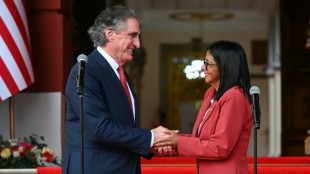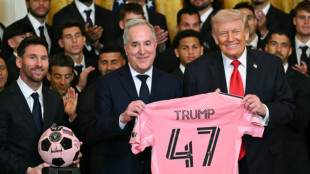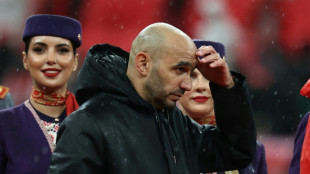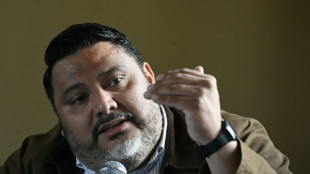-
 Iran missile barrage sparks explosions over Tel Aviv
Iran missile barrage sparks explosions over Tel Aviv
-
US says Venezuela to protect mining firms as diplomatic ties restored

-
 Trump honors Messi and MLS Cup champion Miami teammates
Trump honors Messi and MLS Cup champion Miami teammates
-
Dismal Spurs can still avoid relegation vows Tudor

-
 Berger sets early pace at Arnold Palmer with 'unbelievable' 63
Berger sets early pace at Arnold Palmer with 'unbelievable' 63
-
Morocco part company with coach Regragui as World Cup looms

-
 Lens beat Lyon on penalties to reach French Cup semis
Lens beat Lyon on penalties to reach French Cup semis
-
El Salvador's Bukele holding dozens of political prisoners: rights group

-
 With Iran war, US goes it alone like never before
With Iran war, US goes it alone like never before
-
Spurs slip deeper into relegation trouble after loss to Palace

-
 European, US stocks back in sell-off mode as oil prices surge
European, US stocks back in sell-off mode as oil prices surge
-
Pete Hegseth: Trump's Iran war attack dog

-
 Celtics' Tatum could make injury return on Friday
Celtics' Tatum could make injury return on Friday
-
'Enemy at home': Iranian authorities tighten grip as war rages

-
 Bethell set for 'hell of a career', says England captain Brook
Bethell set for 'hell of a career', says England captain Brook
-
France coach Galthie slams Scotland for 'smallest changing room in the world'

-
 Medvedev arrives in Indian Wells after being stranded in Dubai
Medvedev arrives in Indian Wells after being stranded in Dubai
-
Trump fires homeland security chief Kristi Noem

-
 Mideast war risks pulling more in as conflict boils over
Mideast war risks pulling more in as conflict boils over
-
Wales' James Botham 'sledged' by grandfather Ian Botham after Six Nations error

-
 India hero Samson eyes 'one more' big knock in T20 World Cup final
India hero Samson eyes 'one more' big knock in T20 World Cup final
-
Britney Spears detained on suspicion of driving while intoxicated

-
 Grooming makes Crufts debut as UK dog show widens offer
Grooming makes Crufts debut as UK dog show widens offer
-
Townsend insists Scots' focus solely on France not Six Nations title race

-
 UK sends more fighter jets to Gulf: PM
UK sends more fighter jets to Gulf: PM
-
EU to ban plant-based 'bacon' but veggie 'burgers' survive chop

-
 Leagues Cup to hold matches in Mexico for first time
Leagues Cup to hold matches in Mexico for first time
-
India reach T20 World Cup final after England fail in epic chase

-
 Conservative Anglicans press opposition to Church's first woman leader
Conservative Anglicans press opposition to Church's first woman leader
-
Iran players sing anthem and salute at Women's Asian Cup

-
 India beat England in high-scoring T20 World Cup semi-final
India beat England in high-scoring T20 World Cup semi-final
-
Mideast war traps 20,000 seafarers, 15,000 cruise passengers in Gulf

-
 Italy bring back Brex to face England
Italy bring back Brex to face England
-
French policeman to be tried over 2023 killing of teen

-
 Oil prices rise, stocks slide as Middle East war stirs supply concerns
Oil prices rise, stocks slide as Middle East war stirs supply concerns
-
More flights take off despite continued fighting in Middle East

-
 Ukraine, Russia free 200 POWs each
Ukraine, Russia free 200 POWs each
-
Middle East war halts work at WHO's Dubai emergency hub

-
 Paramount's Ellison vows CNN editorial independence
Paramount's Ellison vows CNN editorial independence
-
US says attacks on alleged drug boats have spooked traffickers

-
 Dempsey returns as Scotland shuffle pack for Six Nations clash against France
Dempsey returns as Scotland shuffle pack for Six Nations clash against France
-
India pile up 253-7 against England in T20 World Cup semi-final

-
 Wary Europeans pledge 'defensive' military aid in Mideast war
Wary Europeans pledge 'defensive' military aid in Mideast war
-
Seven countries to boycott Paralympics ceremony over Russia: organisers

-
 UK's Crufts dog show opens with growing global appeal
UK's Crufts dog show opens with growing global appeal
-
PSG prepare for Chelsea clash with Monaco rematch

-
 Google opens AI centre as Berlin defends US tech reliance
Google opens AI centre as Berlin defends US tech reliance
-
Second Iranian ship nears Sri Lanka after submarine attack

-
 Portugal mourns acclaimed writer Antonio Lobo Antunes
Portugal mourns acclaimed writer Antonio Lobo Antunes
-
Union loses fight against Tesla at German factory

US Federal Reserve with “announcement”
In a widely-followed press conference, the US Federal Reserve (Fed) announced a significant economic contraction in order to control the growing risk of inflation in the United States. With this decision, the central bank is reacting to persistently high rates of inflation and a rapidly changing economic situation. At the same time, the measure sends a signal to companies and financial markets: after a phase of historically low interest rates and extremely loose monetary policy, the course could now change in the direction of a more restrictive phase.
Rising interest rates and tighter monetary policy:
Contrary to the course of recent years, when the Federal Reserve supported the economy with low interest rates, the focus is now on interest rate hikes and a reduction in the Fed's balance sheet. This is intended to dampen excessive demand, slow credit growth and contain inflation. Fed Chairman Jerome Powell emphasized that these steps are necessary to ensure sustainable and stable economic development over the medium term.
Market analysts see the announced contraction as a significant policy shift. Many investors had already expected interest rate hikes, but the clear focus on a restrictive policy exceeded the expectations of some observers. As a result, stock markets came under short-term pressure and the US dollar depreciated slightly against other leading currencies.
Background: Inflation and economic uncertainties:
The rate of inflation in the US has reached record levels in recent months. Supply bottlenecks, rising energy prices and high consumer demand had noticeably driven up prices. In addition, numerous economic stimulus packages initiated in response to the coronavirus crisis have stabilized the economy, but have also led to a high amount of money in circulation.
With the announcement of an economic contraction, the Fed is seeking a balance: on the one hand, price stability and a reduction in speculative bubbles should be ensured, while on the other hand, the Fed wants to avoid an excessive cooling of the economy. Jerome Powell emphasized that developments are being monitored closely and that the Fed is prepared to take action if necessary.
Impact on companies and consumers:
A more restrictive monetary policy primarily affects companies that have relied on cheap credit. For firms that finance growth through debt, costs could now rise, which could slow investment and expansion in some sectors.
Consumers are also likely to feel the effects of rising interest rates, especially real estate buyers and credit card customers. Higher mortgage rates could put the brakes on the residential real estate market and make buying a home more expensive.
At the same time, however, there are also positive aspects: an effective fight against inflation preserves the purchasing power of the population and can reduce speculation risks. In particular, people with savings could benefit from higher interest rates, provided that financial institutions adjust their rates.
Criticism and outlook:
Not all experts consider the Federal Reserve's move to be appropriate. Some critics warn that curbing growth too quickly could jeopardize new jobs and slow down the economic recovery after the pandemic. The fear is that if the US economy cools more sharply than expected, the labor market could deteriorate again and high inflation could only moderate moderately.
Nevertheless, many experts see the decision as overdue. In view of record inflation and a stock market environment that is overheated in some areas, there is a need for action to stabilize the fundamental data again. The coming months will show whether the US economy can strike a balance between stabilizing and avoiding a recession – or whether a more severe downturn is looming.
Conclusion:
The Federal Reserve has sent a clear signal to markets and consumers with its announcement of an economic contraction. Higher key interest rates and a tighter monetary policy should curb the record inflation and enable a more balanced economy. At the same time, there are risks for growth and the labor market if the economic environment deteriorates more quickly than expected. It remains to be seen whether this balancing act will be successful, but it is clear that the latest step marks the beginning of a new phase in US monetary policy.

Belarus: ICC investigates dictator Lukashenko

NATO: Ukraine ‘at the top of the list!’

NATO is training to fight cyber attacks

Digital Ocean Twin: Protecting the Oceans

What is the outlook for France’s economy?

How melting Alpine glaciers affect valleys

The EU Commission and its climate targets?

Irish government to subsidise school books

European democracy is weakening, report warns

Low demand: electric vehicles clog Belgian port

EU calls for tougher measures for a ‘tobacco-free generation’




